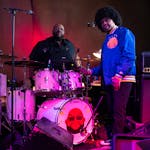As usual, Prince had high expectations.
The superstar who shrouded himself in mystery wanted his memoir to be the biggest music book ever, one that would live up to the hype.
"We need this to get weird," he implored his collaborator, Brooklyn writer Dan Piepenbring. "It's good to be controversial."
When "The Beautiful Ones" arrives Tuesday, it will be neither the biggest music book ever, nor a memoir. But it deserves some hype.
Three months and 28 handwritten pages into the project, Prince died of a fentanyl overdose on April 21, 2016. Piepenbring, a literary-journal editor who'd never written a book, had to salvage the volume with the help of Prince's estate.
In the icon's apartment at Paisley Park, he found a sheaf of papers containing a career's worth of handwritten lyrics, some with words crossed out, some in cursive, some hand-printed, some in capital letters.
In Paisley's top-secret vault, he discovered drawings, a middle-school report card and old photos with captions occasionally scrawled on the back. And he unearthed a crown jewel: Prince's treatment — hand-penned, of course — for the movie that would become "Purple Rain."
Piepenbring, 33, put it all together into a 280-page book the size of a modest novel.
With a mere 40 printed pages featuring Prince's prose, it would be a stretch to call "The Beautiful Ones" a memoir. Like Bob Dylan's acclaimed "Chronicles: Volume 1," it addresses a small slice of its author's life.
It has a scrapbook quality, offering a hodgepodge of photos and ephemera, including those 28 pages from Prince along with lyric sheets and a flier for his father's band, the Prince Rogers Trio. But it's not a coffee-table book either.
Leave it to Prince to give us something impossible to pigeonhole. At least, he provides a few peeks behind the veil, especially when it comes to his early family life and philosophy about life and music.
One of his goals, Prince told Piepenbring, was to rectify the violent image of his father left by the quasi-autobiographical "Purple Rain." And to clarify what his mother meant to him.
That's why the first words from Prince in "The Beautiful Ones" are "my mother's eyes," the first thing he could remember. In careful cursive, he writes about how his mother, Mattie, liked excitement, having fun and dressing up.
His dad, John L. Nelson, was a natty dresser, too. In fact, the son thought his parents competed with one another when it came to stylin' for a night on the town. He loved how they accessorized, dad with cuff links and rings, mom with gloves and hats.
His father emphasized rules and hard work, holding down a day job at Honeywell (in the plastic molding department) and a night gig as jazz pianist. Prince kept his distance because his father "represented discipline." By contrast, the son could let his guard down in the company of women.
"Try as he might to be a fully unique singular figure with no past," Piepenbring said recently in Minneapolis, "Prince was suddenly alive to the possibility that in more ways than he knew, he was his parents' son."
Even though Prince had long been averse to any kind of retrospection, Piepenbring felt there must have been "something therapeutic" about their literary endeavor — "or at least opening your third eye," to use a Prince-like phrase.
Writing about his childhood, Prince says he suffered epileptic seizures starting at age 3 and had his first kiss at 5 or 6. At school, he was teased because of his name. He, in turn, makes fun of a teenage girlfriend with a speech impediment who called him "Pwince."
During his school years, he bounced between north Minneapolis, which he saw as filled with testosterone, and south Minneapolis, which was more feminine.
His parents divorced when he was 10 and his mother soon remarried. While that eased her discontent, Prince didn't get along with his stepfather so he moved in with his father at age 12.
He called it the happiest day of his life. Their bond deepened after seeing the movie "Woodstock" one Sunday after church. "My father understood that night what music really meant 2 me," writes Prince.
The Rock Hall of Famer drops little hints about what informed his songwriting. For instance, his parents' fights prepared him for penning breakup tunes. And when it came to sexy songs, "lust," he wrote, "will draw words from the pen that one doesn't even know exist."
Commenting that he has an overactive brain, Prince goes off on tangents about a potpourri of topics including religion (it's about "self-development"), handwriting ("a lost art in need of resurrection") and DJs (they "bring communities together; the president should be like a DJ").
We also glean his thoughts on other subjects from discussions with Piepenbring, who spends the first 43 pages addressing the making of the book.
Prince wanted to teach readers about racism, the process of creativity and "Black Wall Street," a flourishing district in Tulsa in the early 1900s that was destroyed by a white mob. He thought "freedom" should be the overarching topic as he discussed his life from the beginning to his 2007 Super Bowl performance.
Of course, the collaborators didn't get that far. Piepenbring said he decided to cut the book off at 1986, two years after the film that made Prince a superstar.
"After 'Purple Rain,' he really was so famous that the kind of candid photography you see in this book and the loose, kind of freewheeling personality disappeared. Everything that you saw really had a professional gloss on it."
In their short but revealing time together, Piepenbring concluded that Prince Rogers Nelson lived the life he dreamed of.
"He'd created a persona almost as a prophetic act: He could become the person he imagined," his co-author writes. "His whole life was an act of imagining, creating and becoming."
Twitter: @JonBream • 612-673-1719






